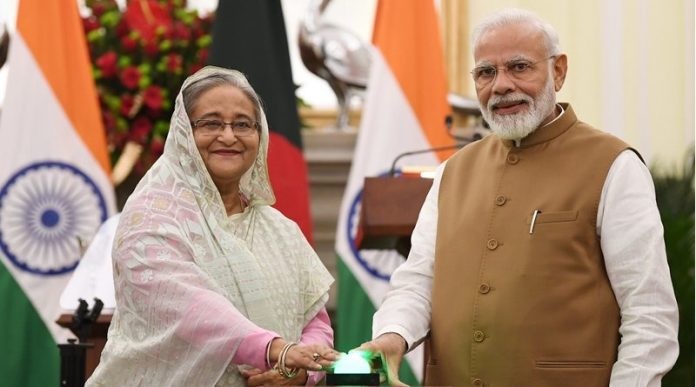India and Bangladesh signed 10 agreements/ MoUs and announced over a dozen other initiatives – spanning across areas like connectivity, health, trade, energy, defence and maritime cooperation – as PM Narendra Modi hosted his counterpart Sheikh Hasina for the first state visit after the formation of the new NDA government. Among the new initiatives was an announcement by Modi after the meeting that India will soon send a technical team to Bangladesh for management and conservation of the Teesta river inside Bangladesh.
The announcement is significant as it comes amid efforts by China to convince Dhaka to allow it to develop the Teesta basin. Aware of India’s reservations about China’s role, Bangladesh has maintained it will consider “geopolitical issues” before going ahead with the project, which will apparently cost $ 1 billion.
Hasina is expected to soon visit China, a country Dhaka – in a fine balancing act – continues to have strong economic ties with for its development needs. “As part of our development cooperation, we will also undertake conservation and management of Teesta River inside Bangladesh with Indian assistance within a mutually agreed timeframe,” said a joint statement, in which the leaders announced a shared vision for commerce, connectivity and collaboration.
Sharing of Teesta waters has remained a long outstanding issue between the countries, after opposition from West Bengal prevented them from signing a water-sharing agreement finalised during the UPA government. India’s technical team is expected to first examine if there’s any need for a reservoir to be built, something which the Chinese have reportedly suggested. For India, it’s important that Bangladesh remains mindful of Indian security concerns while pursuing economic projects with Beijing.
The leaders also welcomed formation of a Joint Technical Committee to initiate discussions for the renewal of the Ganges Water Sharing Treaty of 1996. They pledged to intensify cooperation in border management, counterterrorism and against radicalisation, while agreeing to start talks for a comprehensive economic partnership agreement (CEPA).
“We have prepared a futuristic vision for cooperation in new areas. We have managed to restore in the past 10 years connectivity that was there before 1965. We will now focus on energy and digital connectivity. We will soon launch CEPA negotiations to take our economic cooperation to new heights,” said Modi.
There was focus on long-term defence cooperation as well as India and Bangladesh signed an MoU for cooperation concerning military education in the field of strategic and operational studies. For modernization of the Bangladesh Armed Forces, the leaders said they will explore defence industrial cooperation, while ramping up military engagements in the form of exercises, training and capability development.
The 2 countries announced signing of agreements for digital and green partnerships, as also a significant initiative by India to provide e- visa for medical patients from Bangladesh. “To facilitate easier cross-border travel and as a supportive gesture to the friendly people of Bangladesh, India will extend e-Medical Visa facility to people from Bangladesh travelling to India for medical treatment,” said the joint statement, adding India will also help Dhaka with supply of essential commodities.
Other major announcements included new Assistant High Commission of India in Rangpur in Bangladesh, train service between Rajshahi and Kolkata and bus service between Chittagong and Kolkata. To promote sub-regional connectivity, government said India will extend transit facilities for movement of Bangladesh goods to Nepal and Bhutan through railway network.
India is also looking at early operationalization of two Special Economic Zones (SEZs) offered by Bangladesh to India in Mongla and Mirsharai and to opening of new border-haats. The 2 countries also signed an MoU to enhance railway connectivity. The joint statement also said they will pursue collaboration in frontier technologies, including civil nuclear, oceanography and space technology. “To this end, we will partner in joint development of a small satellite for Bangladesh and its launch using Indian launch vehicle,” it said.









































